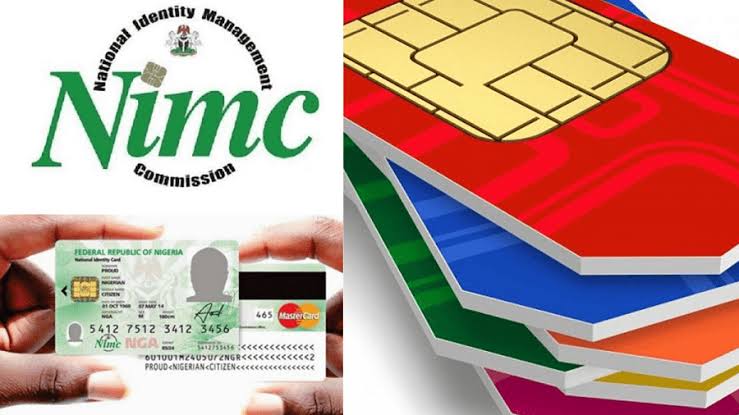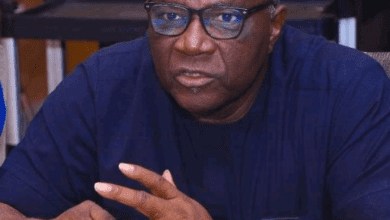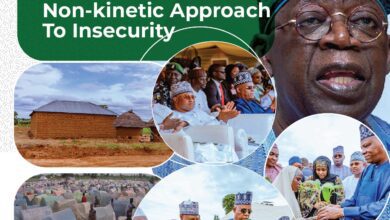SIM Card Deactivation And ITU Digital Agenda

At a time when the International Telecommunications Union(ITU) appears to be racing towards 2030 when every human being on earth is expected to be connected to the internet and mobile networks, no fewer than 42 million mobile network subscribers have been disconnected and therefore disabled from communicating in Nigeria.
They were said to be recalcitrant as a result of their inability and or refusal to link their National Identity Numbers( NIN) to their mobile numbers.
The Nigerian Communications Commission (NCC) gave a mandate to Mobile Network Operators (MNO) to disable unlinked numbers to NIN with a February 28, 2024 deadline to implement the directive.
And it has been so implemented.
Now the chips are down and the 42 million subscribers are out and also down.
Only last week, while the beleaguered subscribers battled to keep pace with their link to the network numbers, there were indications that some of them didn’t even have the NIN let alone link one. There were also some others who claimed to have misplaced their NIN and yet others who allegedly said they actually linked their NIN earlier and wondered why they should be disconnected from the networks.
Like a local parlance goes “there is wahala “ translated to mean “ there’s trouble “.
But this story goes beyond that wahala.
Industry sources said a total of 45 million numbers in the country may be disabled for not linking their subscriber identification Module(SIM) cards with their National Identification Numbers (NINs).
Agency reports say “Out of the 45 million, 42 million lines have neither made a call, had a data session nor sent an SMS in over one year.”
In December 2020, the government announced the integration policy of SIM cards into the NIN database, as a measure to tackle the growing trend of insecurity and kidnapping across the country.
“These 42 million lines have been inactive for over a year. So essentially, from our system checks only about 3 million active lines would be barred. We expect that the users of these lines would come out to submit their NIN and unbar their lines or abandon the lines entirely,” a source explained.
The disconnection on February 28, has been one of the deadliest since 2020 as 42 million subscribers are disconnected from making or receiving calls.
Chairman, Association of Licensed Telecoms Operators of Nigeria (ALTON) Gbenga Adebayo, was quoted as saying that “those affected were mainly connected to devices such as MiFi and tablets, which the subscribers did not link to their National Identification Number (NIN).”
According to him, such SIM cards were connected to the devices before the year 2022 and they had not been in use hence
the subscribers did not see the need to link them to their NIN.
However, the ITU thinks differently as the United Nations multilateral organization continues the race to bridge the digital divide by 2030.
On Broadband/Connectivity
and the need to bridge the digital divide,
ITU Secretary-General Doreen Bogdan-Martin announced last week that over USD 9 billion in investment commitments from mobile operator groups were made to extend global connectivity.
The announcement, made at the Mobile World Congress (MWC), in Barcelona, Spain on February 26, 2024 builds on the mobile industry’s strong support for ITU’s efforts to connect the world by 2030.
Alongside the new commitments, the UN Digital Agency also announced that it now has over 1,000 industry, academia, and organizational members in addition to its 193 Member States. This milestone marks the largest, most diverse membership in the agency’s history.
The new industry commitments raise to over USD 46 billion the total current value of planned investment in infrastructure, services, and support to ITU’s Partner2Connect Digital Coalition since the platform opened in March 2022.
“Universal meaningful connectivity is within our grasp,” said ITU Secretary-General Bogdan-Martin. “Thanks to these new commitments, millions of people will benefit from accessible and affordable connectivity across the world.”
The commitments announced at Mobile World Congress include USD 6 billion between 2024 and 2026 for accessible and affordable network connectivity and digital services across countries in the Middle East, Africa, and Asia China Telecom: Over USD 1.4 billion to roll out fibre-to-the-home (FTTH), providing high-quality information and communication services to over 80 million people in remote administrative villages across China.
Ooredoo: USD 1.1 billion for connectivity in the developing markets ranging from North Africa to the Indian Ocean.
VEON: USD 600 million in building the infrastructure of Ukraine, providing connectivity and digital services essential to the reconstruction of the country.
“I applaud the ITU Secretary-General’s focus on the importance of infrastructure investment to enable the digital economy,” said John Giusti, Chief Regulatory Officer, GSMA. “Mobile operators continuously invest in deploying and upgrading their networks, delivering benefits to citizens in all corners of the globe. I congratulate e&, China Telecom, Ooredoo, and VEON on their investment pledges. I am encouraged that MWC is the event of choice for such commitments and collaboration between the public and private sectors.”
Back home in Nigeria, the agency reports,
say the NCC’s directive for mandatory NIN-SIM linkage grew out of a national security initiative aimed at curbing criminal activities perpetrated through the use of anonymous phone lines.
“By linking phone numbers with a verified national identity, authorities hope to increase user accountability and facilitate the identification of individuals involved in criminal Impact and Potential Repercussions”
The disconnection of millions of lines has undoubtedly caused inconvenience for affected subscribers.
While MTN has stated that many of the disconnected lines belonged to “low-value subscribers,” minimizing the financial impact on the company, the loss of service can be disruptive for both subscribers and corporate organizations.
An analyst reasons that the situation raises questions regarding the accessibility of the NIN registration process and the potential for social exclusion it may create. Furthermore, concerns linger regarding the effectiveness of the NIN-SIM linkage in achieving its intended security goals.
MTN has indicated that they are working with authorities to streamline the NIN verification process and have also implemented various channels to facilitate verification for affected customers, aiming to minimize service disruption. It remains to be seen if these efforts will be sufficient to address the concerns of disconnected subscribers and the broader public.
The NCC’s directive and MTN’s subsequent actions highlight the evolving landscape of telecommunications regulation in Nigeria, with a focus on balancing security concerns with user convenience and inclusivity. It will be interesting to observe how this situation unfolds and the long-term impact it has on the Nigerian telecommunications industry.
New data from the International Telecommunication Union (ITU) shows significant progress in global internet connectivity. Figures for 2023 reveal that the number of people worldwide without internet access has decreased to approximately 2.6 billion, down from 2.7 billion in 2022.
ITU data also highlights that 67 percent of the world’s population, equivalent to 5.4 billion people, are now online. This underscores the widespread internet adoption worldwide, with billions of individuals benefiting from digital access. However, the report emphasises that the digital divide continues to pose a significant challenge. Less than one-third of the population enjoys online access in low-income countries, where internet connectivity growth has been most significant. Despite a 17 percent increase in internet users in these regions over the past year, most citizens in these countries are still disconnected from the digital world.
ITU’s Director of Telecommunication Development Bureau, Cosmas Luckyson Zavazava, underscores that millions of people, particularly in low-income countries, are missing out on the life-changing benefits of internet access in this digital transformation era. The data also highlights the pressing need for more than just internet connectivity. In addition to expanding access, it is crucial to equip users with digital skills, enabling them to harness the internet’s full potential and navigate the online world safely.
The report also highlights a concerning reality: the double-digit growth in internet connectivity observed during the peak of the COVID-19 pandemic 2020 has not been sustained. Current trends, though positive, are not robust enough to guarantee universal and meaningful connectivity for all by 2030. This indicates the need for further efforts to bridge the digital divide and ensure equitable access to the benefits of the Internet.
The policy to deactivate unlinked SIM cards in Nigeria was expected to help the Nigerian authorities in fighting bandits and terrorists who kidnap and kill innocent people daily.
Despite the extension of deadlines, many phone lines are yet to be linked. Three years later, it is not clear how much the SIM-NIN connection has helped in fighting insecurity as terrorists have continued to attack the citizens.
The policy was expected to help the authorities in fighting bandits and terrorists who kidnap and kill innocent people daily.
Despite the extension of deadlines, many phone lines are yet to be linked. Three years later, it is not clear how much the SIM-NIN connection has helped in fighting insecurity as terrorists have continued to attack Nigerians.
NCC boss,, Aminu Maida spoke on the eve of the disconnection deadline saying “Pre-registered or illegally registered SIM has been a challenge for a long time. In 2021, there was a policy to link NIN with SIMs thinking that such will take care of the problem but people in the value chain lashed out on loopholes.”
He added that the commission will hold telecom service providers accountable for service delivery to customers.
“You are going to see a change in the way we make decisions; we are going to be very data-driven. All our decisions are going to be backed up by data as much as possible. We want to reduce subjectiveness and make the right decisions that will improve the industry.
“We intend to hold our licensees accountable for all services. After all, the consumers pay for the services and they expect the service to be at a certain level or point so we will be holding our licensees accountable to ensure they deliver on their obligations to their licenses.
“We need to put smiles back on the faces of consumers. NCC is clear on this; we need to protect the interest of consumers. They remain number one because that is where you extract values from. Yet, the interest of licensed operators will also be protected while we put eyes on their activities to see the level of compliance,” he said.
He explained that the commission would focus more on the consumer, government and licensees, and the industry.
“The commission also will be driven by the recognition that we have primarily three critical stakeholders in the industry. These are the consumers of telecom services, the industry, and the licensees. The topmost are the internet service providers (ISPs), submarine-landed cable companies, and all of the licensees of the commission and last but not least, the government,” he said SIM has been a challenge for a long time. In 2021, there was a policy to link NIN with SIMs thinking that such will take care of the problem but people in the value chain lashed out on loopholes.”
He added that the commission will hold telecom service providers accountable for service delivery to customers.
“You are going to see a change in the way we make decisions; we are going to be very data-driven. All our decisions are going to be backed up by data as much as possible. We want to reduce subjectiveness and make the right decisions that will improve the industry.
“We intend to hold our licensees accountable for all services. After all, the consumers pay for the services and they expect the service to be at a certain level or point so we will be holding our licensees accountable to ensure they deliver on their obligations to their licenses.
“We need to put smiles back on the faces of consumers. NCC is clear on this; we need to protect the interest of consumers. They remain number one because that is where you extract values from. Yet, the interest of licensed operators will also be protected while we put eyes on their activities to see the level of compliance,” he said.
He explained that the commission would focus more on the consumer, government and licensees, and the industry.
“The commission also will be driven by the recognition that we have primarily three critical stakeholders in the industry. These are the consumers of telecom services, the industry, and the licensees. The topmost are the internet service providers (ISPs), submarine-landed cable companies, and all of the licensees of the commission and last but not least, the government,” he said.






